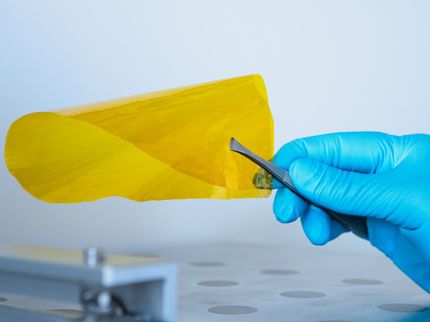Lasers for hydrogen technology
Fraunhofer ILT inaugurates new research platform
The success of the energy transition is closely linked to continued research into hydrogen technologies. A major goal of Fraunhofer ILT is to make the fuel cell ready for series production. To this end, the Aachen researchers are setting up a hydrogen laboratory on more than 300 square meters of laboratory space: Here, a wide range of laser technology test facilities will offer public projects and industrial cooperation a research platform that is unique in Germany. On May 5, 2022, the new Hydrogen Lab will open its doors for the first time to participants of the “International Laser Technology Congress AKL'22” in Aachen as part of ILT’s biannual event “Laser Technology Live.”

Hydrogen – energy carrier of the future.
© Fraunhofer ILT, Aachen
In many parts of the world, climate change has become an immediate existential threat with global ramifications. In accordance with the Paris Agreement, Germany plans, therefore, to become climate-neutral by 2045 – i.e. it will no longer produce any CO2 emissions.
To ensure that the energy transition succeeds, scientists not only at the Fraunhofer Institute for Laser Technology ILT, but throughout Germany are developing new technologies for energy generation and use that are sustainable, efficient and economical, and hydrogen technology plays a prominent role in this. Hydrogen produced in a climate-friendly way makes it possible to reduce CO2 emissions wherever energy efficiency and the direct use of electricity from renewable sources are not sufficient. There, hydrogen produced at excess production times with electricity from renewable sources can replace coal. Hydrogen-fueled peak-load power plants, in turn, could ensure that the energy supply is secure.
Fraunhofer ILT is constructing its own hydrogen laboratory, thus creating ideal framework conditions to optimize the fuel cell as the heart of hydrogen technology all the way to series production readiness. The Hydrogen Lab will be officially opened on May 5, 2022 at the "International Laser Technology Congress AKL'22". Since the laboratory’s wide-ranging technical equipment is found in a single space, it will make seamless interdisciplinary collaboration possible. This gives public projects and industrial cooperation a unique space to achieve synergy effects of all kinds at the highest scientific and technological level.
Optimizing the fuel cell
The activities in the Fraunhofer ILT’s new Hydrogen Lab are embedded in the institute’s business strategy. Fraunhofer scientists are conducting research in various projects to advance the cost-optimized and demand-oriented series production of fuel cells, to unlock their technological and economic potential and to accelerate the structured rollout in industry and society.
For example, researchers at Fraunhofer ILT are working on of laser processes for the production of bipolar plates used in fuel cells. By selectively structuring and coating bipolar plates, research can significantly improve their efficiency and functionality. The new Hydrogen Lab gives researchers at both Fraunhofer ILT and their partners from science and industry new opportunities to link process results from manufacturing technology with the performance and functionality targets they have set.
Unique in the German research landscape
On 300 square meters, the new Hydrogen Lab at the Fraunhofer ILT will provide a wide range of laser-based experimental facilities for variable dimensions and designs. The facilities do not only cover the laser-related manufacturing steps along the process chain for manufacturing metallic bipolar plates: Rubber pad forming with a hydraulic press, for example, makes it possible to produce bipolar plates in small quantities. But the facilities are also available for structuring with ultrashort pulse lasers, for laser-based coating, and for high-speed welding and cutting. Existing test rigs can be used to evaluate the laser-manufactured components not only in terms of hydrogen tightness, but also efficiency. “In Germany, of course, there are other well-known research institutes working on hydrogen, and we are in constant exchange with them,” says Dr. Alexander Olowinsky, head of the Micro Joining Group at Fraunhofer ILT. “However, in terms of the variety of practical possibilities, our new hydrogen laboratory is unique.”
In 2020, Fraunhofer ILT already launched a platform for professional exchange around innovations in the field of hydrogen technology: the LKH2 - Laser Colloquium Hydrogen. In September 2021, it took place for the second time and will again offer networking opportunities this coming September. By constructing the new hydrogen laboratory, Fraunhofer ILT is creating optimal conditions for bringing together the findings from the various subareas at a central location. “We are not waiting, we are forging ahead,” says Olowinsky, co-initiator of LKH2 and in charge of the construction of the new Hydrogen Lab. “We have identified which tasks still need to be solved. That’s what we want to work on now before it’s too late.”
Public projects and industry cooperation
For the future, Fraunhofer ILT could conceivably implement a wide range of projects. “We could work with component manufacturers for fuel cells as well as with partners who want to produce manufacturing technology such as scanners or tools for process monitoring or with those who want to test beam sources,” Olowinsky is convinced. Ongoing projects could also be transferred to the new Hydrogen Lab. “The facilities also cover issues we have encountered in ongoing investigations with customers. We expect to make significant progress because the new machines have much lower restrictions in terms of speed, accessibility and controllability.“






























































